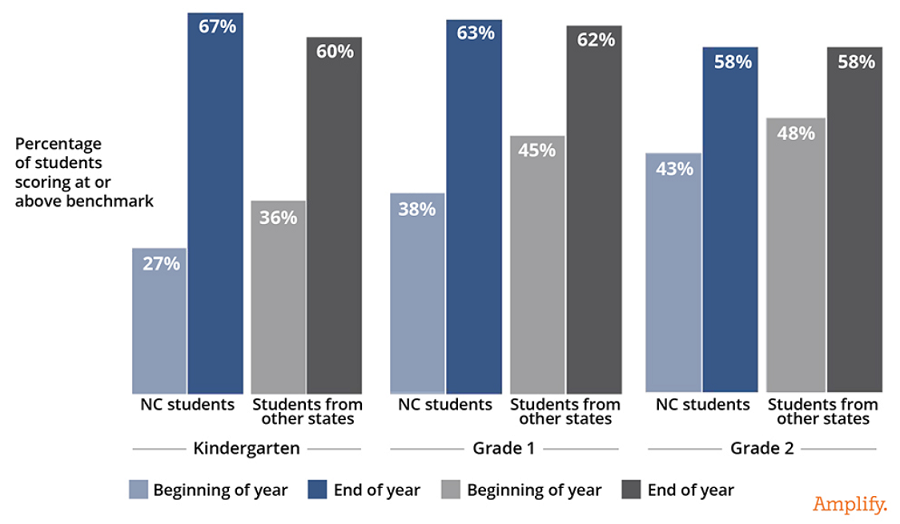
Special to Iredell Free News
RALEIGH — North Carolina’s youngest students made strong gains in early literacy skills during the 2021-22 school year, outpacing the performance of students in other states where the same assessment is used to measure student progress throughout the year.
The gains were achieved during the first full year of a far-reaching statewide initiative to support elementary school teachers with extensive training in instruction based on the “science of reading,” a phonics-based approach with strong evidence of effectiveness. State education leaders are encouraged by last year’s assessment outcomes, which they say are an early indication that schools across the state are embracing the science of reading in the classroom even as many teachers are still learning about it through the two-year professional development program, Language Essentials for Teachers of Reading and Spelling, or LETRS.
The early literacy evaluation, an updated version of an assessment called mCLASS with DIBELS, is based on the science of reading and measures students’ proficiency in such key skills as phonemic awareness and phonics. The tool was used with all kindergarten through third grade students in North Carolina for the first time in the 2021-22 school year. Assessment results showed North Carolina students in all four grades made greater gains from the beginning of the school year to the end than students in other states using the same assessment.
State Superintendent of Public Instruction Catherine Truitt said the results show that the state is using the best approach to boost the literacy skills of all students.
“North Carolina took a huge step forward with the passage of the Excellent Public Schools Act in the spring of 2021, ensuring that all students learn to read based on the principles outlined by the science of reading,” Truitt said. “We still have a long way to go, but the results we’re seeing from last year are clearly pointing in the right direction. We’re going to reach the goal of getting students to be proficient readers by the time they finish third grade.”
The gains made by North Carolina students last year were compared with the gains of 1.6 million K-3 students elsewhere in the nation whose progress was tracked with the same assessment, according to Amplify, the education company that provides the mCLASS assessment under contract with the Department of Public Instruction.
NC K-2 Early Literacy Assessment Results vs. Students in Other States, 2021-22

Amplify reported significant increases in proficiency at every level in North Carolina grades K–2 by the end of the 2021-22 year, as measured by mCLASS with DIBELS 8th Edition benchmark data when compared with a data set representing students in all states except North Carolina.
Additional data can be found HERE.
The assessment that North Carolina schools used during the 2021-22 school year more closely matches the science of reading’s emphasis on five critical components: phonemic awareness, phonics, fluency, vocabulary, and comprehension. Consequently, comparisons from last year’s results to past years are not compatible.
Additionally, the assessment results are not comparable to the state’s end-of-grade reading tests, which are administered beginning in the third grade. Those exams measure whether a student has mastered grade-level standards, from a basic level to more rigorous comprehension, while the mCLASS assessment measures the essential, foundational skills that students need to become successful readers.
Teachers administer the mCLASS assessment with students individually at the beginning, middle and end of the school year, and are encouraged to use it at other times to monitor student progress. In addition to student progress data, the various components of mCLASS also help guide teachers in their literacy instruction and interventions.
Amy Rhyne, who leads the state’s early literacy program as director of the Office of Early Learning at the Department of Public Instruction, said she believes the state gains last year can be attributed to strong leadership and the commitment of teachers in school districts across the state to help drive the significant shift in early literacy teaching and learning.
“With the statewide focus in North Carolina on the science of reading, many districts jumped ahead of the formal LETRS training so they could learn more about the science of reading and establish aligned processes,” Rhyne said. “In many cases, we are seeing positive trends where the leader is onboard and advocating for this shift, as well as clear processes to support the implementation.”



